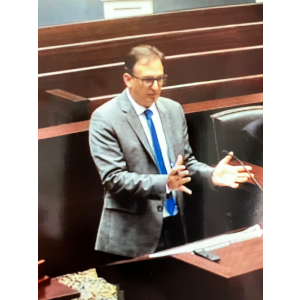No. A guardianship court should always appoint a next of kin over a stranger if that person is capable of serving and asks to be appointed.
In Silveira v. Guardianship of Ana Maria Quiroga, the Chief Executive Officer of Kindred Hospital (“CEO”) filed a petition in the Florida guardianship court to determine whether Ana Maria Quiroga was legally incapacitated and seeking the appointment of a public guardian. The petition provides the name of Ana Maria’s next of kin, listing her sister, Ursula Silveira, and her mother, Digna Lopez. The CEO filed a formal notice of the petition to determine incapacity and for the appointment of a guardian. The formal notice indicated that a hearing was set to occur on May 14, 2013. Formal notice was sent to Ana Maria and Ana Maria’s sister, Silveira, and Ana Maria’s mother, Lopez.
Four days before the scheduled May 14, 2013 hearing, Silveira filed a notice with the Florida guardianship court indicating that Silveira would be unavailable through May 30, 2013 and claiming that Silveira was Ana Maria’s guardian. The hearing on incapacity and for appointment of guardian went forward despite Silveira’s notice of unavailability. Ana Maria was found to be totally incapacitated and in need of a plenary guardian. GPDC, a Florida public guardian, was appointed as Ana Maria’s plenary guardian. As the court stated:
A public guardian should be appointed where “there is no willing and responsible family member or friend, other person, bank, or corporation available to serve as guardian for an incapacitated person, and such person does not have adequate income or wealth for the compensation of a private guardian.’ §744.702, Fla. Stat. (2011). In addition to being ‘willing and responsible,’ the family member or friend seeking to be appointed guardian cannot be statutorily disqualified to be appointed as guardian. See § 744.309(3), Fla. Stat. (2013).
The record before the Florida appellate court did not explain why the Florida guardianship court appointed a public guardian when Silveira was willing to serve as guardian and actively attempted to take that role.
After the public guardian was appointed, Silveira filed numerous motions and petitions with the Florida guardianship court basically seeking to have the public guardian removed and Silveira appointed. The motions and petitions were not legally sufficient. In response to the numerous motions and petitions filed by Silveira, the Florida guardianship court entered two orders. The first order ordered that if Silveira wanted to become the legal guardian of Ana Maria, then Silveira needed to retain an attorney and file the appropriate petition, and, in the interim, Silveira was prohibited from professing to be Ana Maria’s guardian. The Florida guardianship court’s second order ordered that the clerk of court was to accept no further pleadings from Silveira. Silveira appealed both orders.
The Florida appellate court found that any prohibition on Silveira filing pro se motions on the ground that guardians must be represented by an attorney was misplaced, because Silveira was not a guardian as defined in the Florida Probate Rules or the Florida Guardianship Code. See Fla. Prob. R. 5.015(b)(6) (defining a “guardian” as “ a person appointed pursuant to chapter 744, Florida Statutes, or a guardian advocate unless a rule indicates otherwise”); see § 744.102(9) (defining a “guardian” as “a person who has been appointed by the court to act on behalf of a ward’s person or property, or both”).
The Florida appellate court also noted that the Florida guardianship court has the inherent power to prevent abusive litigants from continuously filing frivolous petitions, and to require such a litigant to obtain counsel to proceed. However, Silveira’s actions had not risen to the point where she should be precluded from filing pro se pleadings.
The order requiring Silveira to retain an attorney to file a petition for appointment of a guardian was quashed, as was the portion of the order directing the clerk of court not to accept any further filings from Silveira. The Florida appellate court upheld the part of the order that prohibited Silveira from holding herself out as Ana Maria’s guardian.
It is unclear why Silveira, if she was intent on becoming Ana Maria’s guardian, did not file a petition for appointment as guardian and make herself available for the scheduled hearing, particularly given the time-sensitive nature of guardianship proceedings. Instead of arguing the issue of the appropriate guardian initially, because of the delayed filing by Silveira, almost two years has passed with a Florida public guardian serving instead of a family member.








